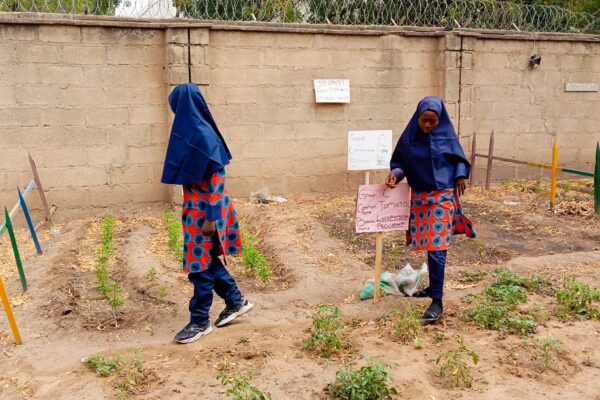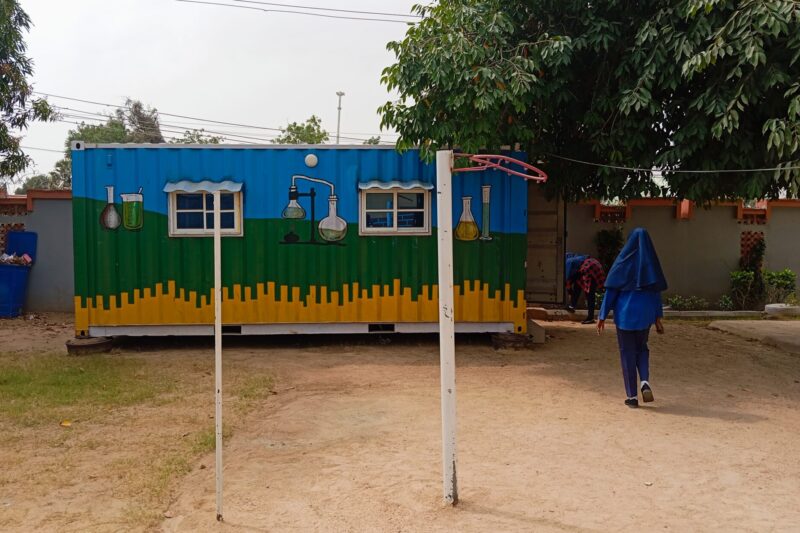Lafiya Sarari embeds the concepts of creativity, critical thinking, tolerance, character building, acceptance, etiquette, hygiene, peace and unity.
When her parents were killed in a violent attack by insurgents, a terrified young orphan walked almost 90km from Damboa to Maiduguri in Borno State to seek shelter in an internally displaced persons’ camp.
“I was helpless and frightened,“ said Aisha Bukar, now 21. “I lived with my parents in Damboa. When the insurgents attacked our town in 2012, they killed my mother and father. I had to walk a long way to get to an IDP camp in Maiduguri. It was hard.”
Her future looked bleak but her life changed for the better when she went to live with her grandmother in the Suleimanti community in Damboa Road in Maiduguri.
“It was then that I was approached by the Neem Foundation and I began attending Lafiya Sarari, a teaching centre that was established to provide a safe space of learning and psychosocial support for young girls who are victims of the insurgency.”
The motto of Lafiya Sarari, which means “safe space”, is Citadel For Learning, Tolerance and Unity.
The learning centre embeds concepts such as creativity, critical thinking, tolerance, character building, acceptance, etiquette and hygiene.
Lafiya Sarari supports the development of life skills for 100 selected girls who would not otherwise have access to education.
The initiative improves the quality of their learning experiences and prevents radicalisation by raising the overall standard of teaching and instilling basic core values.
The initiative is designed to give beneficiaries a safe and supportive environment and the necessary tools to ensure that they succeed in school and life in the future.
Although, recovery or healing does not necessarily mean complete freedom from post-traumatic memories, the result of the brutal insurgency in Borno State, it helps pupils to live in the present without being overwhelmed by thoughts and feelings of the past.
Bulama Abiso, the headmaster, said the main objective of the initiative was to create learning spaces where traumatised pupils would be taught basic literacy and numeracy, as well as life skills in line with the national curriculum.
He said Lafiya Sarari provided a safe and conducive environment where children were free to express themselves, think creatively and receive psychosocial care.
Beneficiaries were taught to embrace eight key core values: tolerance, justice, empathy, peace, respect, unity, integrity and honesty.
The 100 pupils – all girls – did not pay for their tuition and they were given food and healthcare services for free, even though Lafiya Sarari was not a boarding school.
“Lafiya Sarari was established in Maiduguri, Borno State, so that we could collaborate with the federal and state governments, as well as international humanitarian agencies, to expand the presence of trauma-healing. Our aim is to provide psychosocial care to as many girls as possible.
“Most of the girls are orphans. They were psychologically damaged by the violence they witnessed during the insurgency. It is only by healing their trauma that they can be rehabilitated and learn to live in the outside world without having to cope with mental disorders that could prevent them from having a fulfilling future.”
Abiso said the present group of girls had attended the learning centre for seven years and they would soon graduate.
“That’s when we will recruit and enrol more pupils.”

Photo credit:
Shettima Lawan Monguno
Mohammed El-Zubair, a teacher at Lafiya Sarari, told RNI that the curriculum of the school comprised the national curriculum, including English and mathematics, as well as core social values.
Creativity, arts and innovation formed part of the pupils’ education.
“We try to ensure the girls forget, or at least are able to cope with, their past experiences. We introduced several sporting activities to build their resilience.
“They are empowered by training in agriculture, the creative arts and technology, including computer and science programmes.
“Mini-farmlands allow them to work the land and we also teach them how to rear livestock.”
Ya Aisha Mohammed Kachalla, the art and crafts teacher, told RNI that when the girls were enrolled it was sometimes difficult to teach and control them because of the violence they had encountered as young children.
“There were sometimes as many as five or even more fights a day. The girls insulted one another using vulgar language. We had to teach them to live by core values.
“But now, we thank God because the girls have a different attitude. They do not focus on their past experiences and they are enthusiastic about their future. As they have learnt new skills they and their attitudes have changed. At present they are preparing to write their final-year examinations so that they can advance to tertiary institutions.”
Aisha Bukar said she was extremely grateful for the education she had received at Lafiya Sarari.
“Apart from learning to read and write in English and do maths and science, I have learnt how to live peacefully with others. The teachers take such good care of us that we often forget we are orphans. I am excited about my future. I plan to study and aim to become a respected gynaecologist so that I can help other young women.”
SHETTIMA LAWAN MONGUNO








